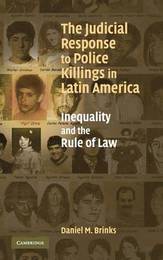
|
The Judicial Response to Police Killings in Latin America: Inequality and the Rule of Law
Hardback
Main Details
| Title |
The Judicial Response to Police Killings in Latin America: Inequality and the Rule of Law
|
| Authors and Contributors |
By (author) Daniel M. Brinks
|
| Physical Properties |
| Format:Hardback | | Pages:302 | | Dimensions(mm): Height 240,Width 161 |
|
| ISBN/Barcode |
9780521872348
|
| Classifications | Dewey:344.805232 |
|---|
| Audience | | Professional & Vocational | |
|---|
|
Publishing Details |
| Publisher |
Cambridge University Press
|
| Imprint |
Cambridge University Press
|
| Publication Date |
22 October 2007 |
| Publication Country |
United Kingdom
|
Description
This book documents the corrosive effect of social exclusion on democracy and the rule of law. It shows how marginalization prevents citizens from effectively engaging even the best legal systems, how politics creeps into prosecutorial and judicial decision making, and how institutional change is often nullified by enduring contextual factors. It also shows how some institutional arrangements can overcome these impediments. The argument is based on extensive field work and original data on the investigation and prosecution of more than 500 police homicides in five legal systems in Argentina, Brazil, and Uruguay. It includes both qualitative analyses of individual violations and prosecutions and quantitative analyses of broad patterns within and across jurisdictions. The book offers a structured comparison of police, prosecutorial, and judicial institutions in each location, and shows that analyses of any one of these organizations in isolation misses many of the essential dynamics that underlie an effective system of justice.
Author Biography
Daniel M. Brinks is assistant professor of government at the University of Texas at Austin, teaching comparative politics and public law, with an emphasis on politics and democracy in Latin America. He holds a Ph.D. in political science from the University of Notre Dame and a J.D., cum laude, from the University of Michigan Law School. Professor Brinks's research has appeared in journals such as Comparative Politics, Studies in Comparative International Development, Comparative Political Studies, and the Texas International Law Journal. Among his many awards and accolades, Brinks has received Honorable Mention in the Gabriel Almond Competition for Best Dissertation in Comparative Politics (2006), the Helen Kellogg Institute for International Studies Visiting Fellowship (2006-07), Eli J. and Helen Shaheen Notre Dame Graduate School Award in the Social Sciences (2004), the American Bar Foundation Doctoral Fellowship (2002-04), the Social Science Research Council International Dissertation Research Fellowship (2000-01), and a Fulbright Fellowship (2000-01, declined).
Reviews"Daniel Brinks has written a superb book by any standard. Theoretically generative, Brinks presents original ways of thinking about access to justice, judicial independence, judicial decision-making, courts, police violence, the legal complex, and inequality before the law. Methodologically rich, the variegated qualitative and quantitative data on five cities in three countries (Brazil, Argentina, Uruguay) allow Brinks to elaborate refined and contingent hypotheses that should spawn research across the world. Pragmatically significant, Brinks shows that democratic politics remain incomplete without protection of core civil rights just as the rule of law rests on particular configurations of politics. This book establishes grounds for a long overdue rapprochement between comparative politics and sociolegal scholarship. It is essential reading for specialists on all countries where the struggle for basic legal freedoms continues unabated." Terence C. Halliday, Center for Law and Globalization, American Bar Foundation and University of Illinois College of Law "This is an impressive study, both for its theoretical conceptualization and its empirical findings. It has broad implications for the study of courts and the legal process in Latin America, and for the debate about the importance of institutional design factors to the understanding of political systems." Nancy Maveety, Tulane University "Daniel Brinks' book on the rule of law in Latin American democracies shows how rights, even if legally recognized, often remain purely formal rights due to disparities in economic power and a lack of investment of state resources. The combination of political and legal analysis, still rare in comparative politics, is particularly innovative and fruitful. And the data Brinks has collected allows him to depict the real workings of the justice system and to assess the effect of the social and political context on judicial decisions. This is an important work that tackles a hard question and makes a major contribution to the burgeoning literature on democracy and the rule of law." Gerardo L. Munck, School of International Relations, University of Southern California "Although the literature on the rule of law in Latin American is growing fast, this book breaks new ground on both a theoretical and empirical level, presenting research on the judicial response to police homicides in Buenos Aires and Cordoba in Argentina, Montevideo in Uruguay, and Sao Paulo and Salvador in Brazil. Most detailed studies of the judiciary focus on only one jurisdiction, while Brinks- study compares five in a consistent manner. The work is innovative in defining and operationalizing the concept of legal tolls. It makes the important argument that the differential response to police killings in the courts is due primarily to the socioeconomic inequalities between claimants, and that this more important than, for example, the institutional design of the court systems or the nature of the functionaries within them. This book will make fascinating reading for anyone interested in judicial behaviour, the rule of law, public security, and Latin American politics and society." Anthony Pereira, University of East Anglia "A highly original argument that gives voice to the poor and stern warning to scholars and policy-makers about the inadequacy of judicial response in three states. A compelling blend of legal exactitude, social science theory and compassion." Nancy Bermeo, Nuffield Professor of Comparative Politics, Oxford University
|